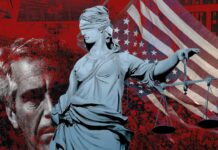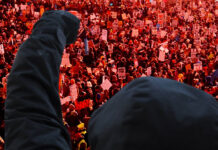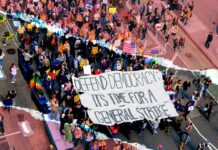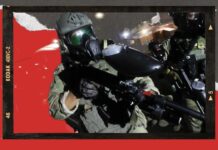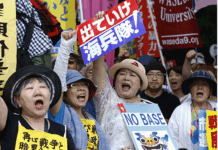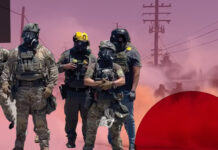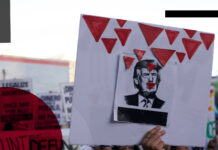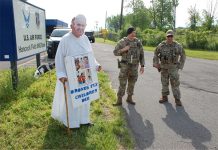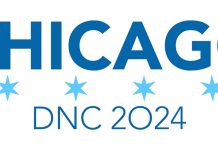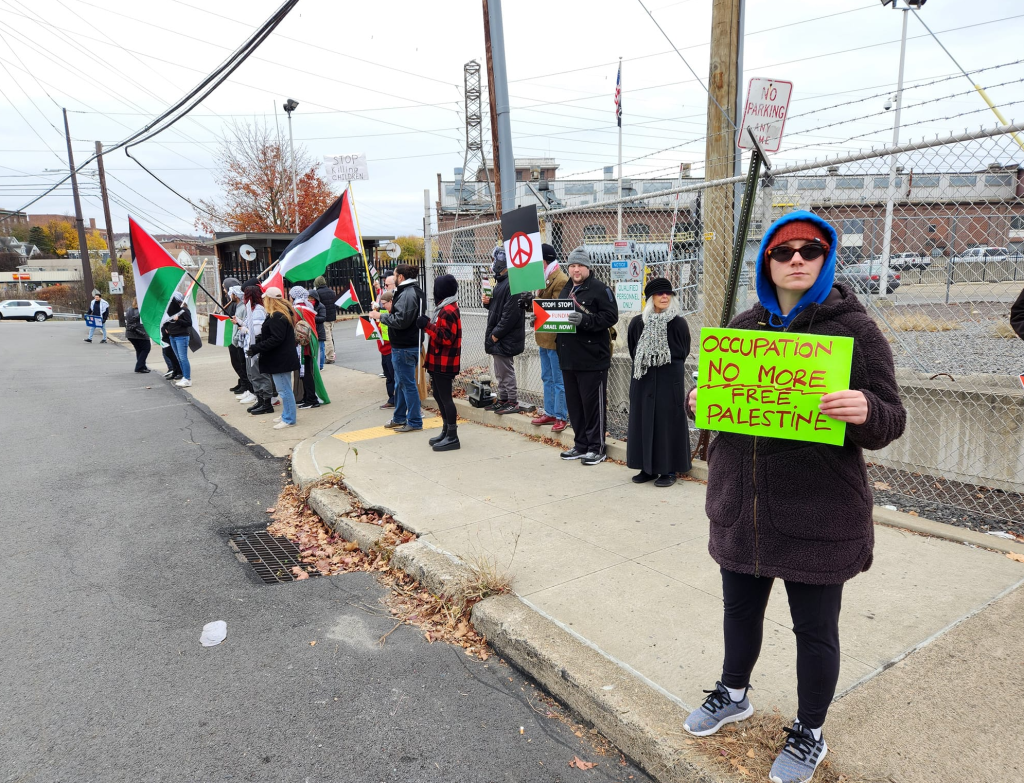
If you are appalled by Columbia University students occupying an iconic campus building made famous by 1960s anti-war student protests, patriotic thoughts of the Boston Tea Party must terrify you.
Columbia protesters broke a few windows in their continuing demonstrations against the Israeli/American genocide against Palestinians in Gaza. Tea Party insurrectionists rallied revolutionaries across 13 colonies to stand against tyranny.
Proud student radicals at colleges and universities across America now confront a police state and the wholesale American-made extermination of tens of thousands of civilian men, women and children.
Aging and gray at 73, yet as committed to the rising as ever, I stand with rebels past, present and future. Half-a-century ago as a young counterculture guerrilla in the nation’s capital, I, too, faced off against riot cops and the power of the Establishment. Revolution is worth the struggle.
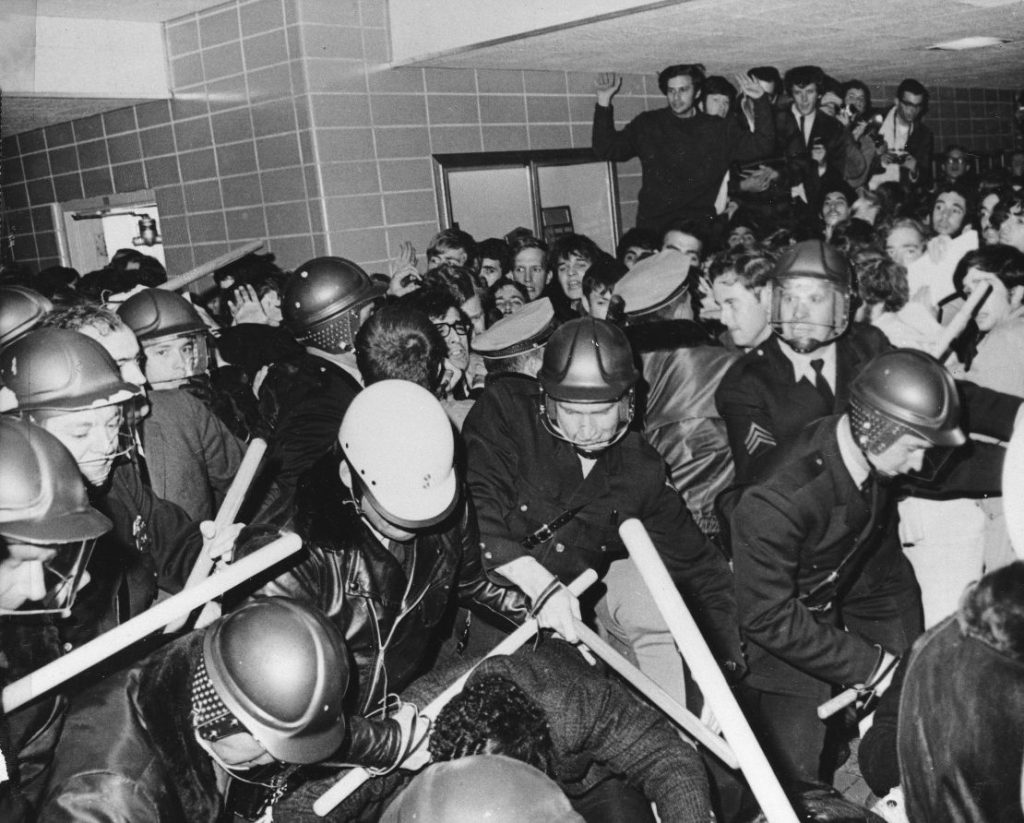
In my flashback, a solitary siege and personal political epiphany mingles with acrid pot smoke and poisonous tear gas burning my eyes. It is November 14, 1969, a chilly Friday night in Washington, D.C., when normally refined DuPont Circle boils over with turmoil and violence.
I am 18 years old.
The Vietnam draft is eating up male teenagers very much like me who die in thick, humid jungles in a corrupt and apocalyptic South Vietnam. Mostly white long-haired radicals smolder with tension amid rumors of riot cops heading our way. National Guard troops with loaded rifles patrol in troop convoys. We are rocking with unrest.
To confront the CS chemicals in the air, I do need a weatherman to tell which way the wind blows.
I started classes at the Pennsylvania State University two months earlier, “on my own” for the first time in my life. Max and Gary, a couple of non-college buddies with whom I played varsity sports in high school, drove from one part of the rural Keystone State to another in State College for the weekend to hang out in my dorm room, smoke weed, drink sweet Bali Hai fruit wine and maybe drop little purple pills of $3 organic mescaline.
Mike and Brian, two other freshmen from the fourth floor of Beaver Hall where my peers had elected me floor president (I got thrown out of the dorm the next year after a drunken fist fight), crash the party waving a poster advertising a massive anti-Vietnam War demonstration a good four-hour drive away.
Like Grace Slick and the Jefferson Airplane urge on their new album, “Got a revolution, got to revolution.”
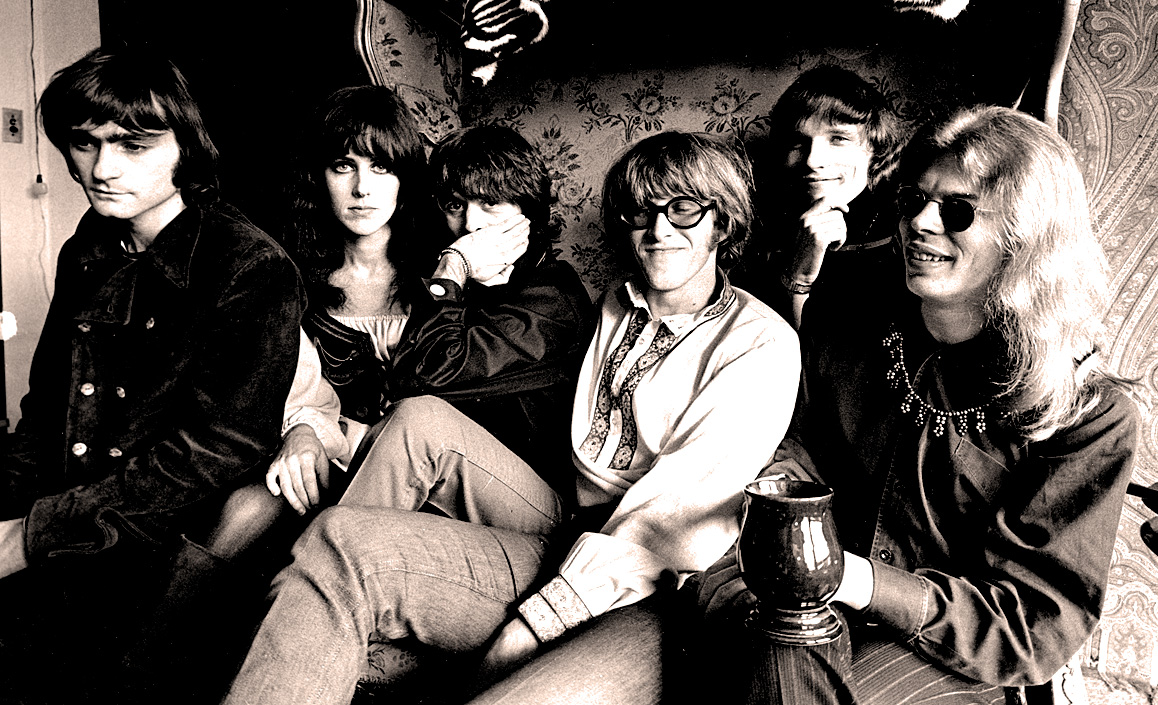
And my four buddies are not even political.
When we pull into the nation’s capital packed into Max’s boxy Ford Falcon, the crowd surrounding us on all sides is so massive that traffic freezes. A ragtag army advances with purpose none of us knew existed as we pile out of the car and stare.
Unfamiliar raucous chants of “Ho, Ho, Ho Chi Minh, the NLF is gonna win” erupt, pounding echoes in our brains as ominous as a fresh clenched-fist tattoo etched in black ink. We are too naive to understand the roar for the National Liberation Front as an endorsement of President Richard Nixon’s enemy in America’s war, the North Vietnamese army and the Viet Cong killer guerrillas I heard little about back home when Rich and Bing and Danny and Larry came home privately traumatized from the war—or when little Mike Wright was the first boy on our block to come home in a box.
I refused to go to Mike Wright’s viewing at the tiny town firehouse, instead choosing to drink beer on another friend’s front porch on High Street in Duncannon, PA. A guy I knew who passed the house said even laying in his coffin dead in his Army uniform, Mike’s smooth young face looked peaceful, like he was asleep. The mourner said somebody told him the piece of shrapnel that pierced Mike’s heart was as thin as a sewing needle.
Red, yellow, black and green banners snap and wave in the cold wind. Giant papier-mâché heads bounce up and down, freaky carved political puppets alive and dangling from poles as budding tribes of untamed natives howl “YIPPIE” and race deeper into menacing carnival streets that grow insanely intense.
Jumping up and down in faded blue jeans, a white T-shirt, and tan desert boots with no socks, Brian keeps a lit Marlboro dangling from his lips. Brian loves life, plays primitive blues piano, dances alone to Van Morrison and harmlessly flirts with young women who smile in return. Brian never saw anything like this scene. None of us has.
Mike, Brian’s Bucks County roommate from Yardley, PA, pounds on the car roof screaming, “Holy shit, holy shit.” Chilly as it is, Mike is dressed in the same uniform he wears to class in all weather—black loafers, no socks, blue jeans, white T-shirt and a thin brown suede jacket—that carries him through college to the day he graduates with two degrees. Transfixed, Mike rushes the crowd like a fullback spotting a hole.
Knowing there is no going back, I follow. Slung over my shoulder I carry a blue gym bag containing a pen and a spiral notebook as I dive deep into the first breaking news story I assign myself. A seething sea of protesters swallows Max’s Ford Falcon that disappears in the madness.
Brian vanishes.
Max and Gary fade away.
I am wearing a thick orange turtleneck sweater I borrowed from Dean who lives in Beaver Hall. He and his roommate are the first Jews I ever met. Despite my rural white upbringing, I made friends with two Black guys from Philly, too. College expands our horizons. The threat of dying in an unjust war does too. My uniform for the uprising includes blue jeans, brown Dingo boots endorsed on TV by celebrity football star Joe Namath himself and a heavy blue Navy peacoat through which I can feel my beating heart.
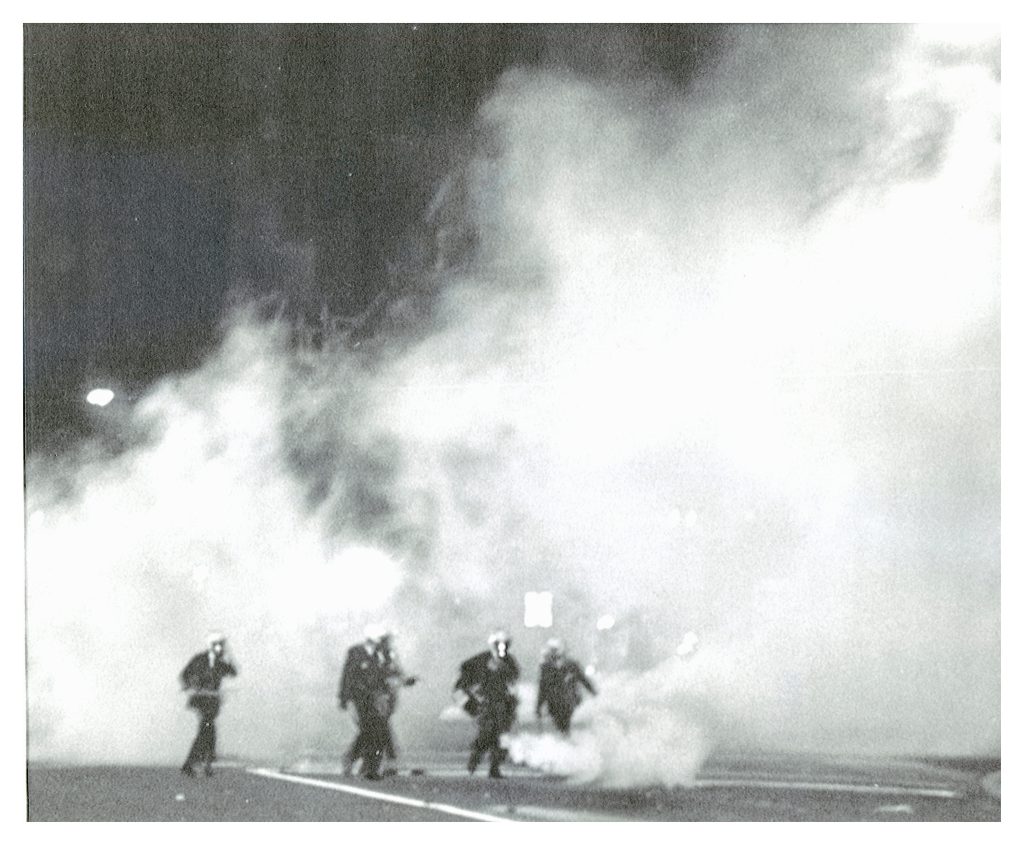
Tear gas accumulates in clouds hanging above the trees, ripping into our eyes, tearing our vision and burning our nostrils, slapping us into an altered state of consciousness that is far scarier than three-dollar mescaline. Desperate, moving hard and fast across Dupont Circle, Mike and I spot the red neon sign of a bar and push our way inside like scarred street commandos escaping enemy captors through the open doors of rebellion. We are experts now, a new generation’s raw electric eyes to an insurrection in a city preparing for a mobilization of up to 750,000 people who oppose our government’s cruel war in Southeast Asia.
“What’s it like out there?” asks an excitable Establishment type.
Holding out the lapels of my thick coat, I say, “Take a whiff of this, man.”
Turning away from the stinging, clinging gas mist nobody will mistake for Jade East or Hai Karate cologne, he quickly backs off. Mike and I offer knowledge like Fidel and Che just back from the Sierra Maestras, regaling our privileged inquisitors with mind-blowing urban warfare observations that portray us as more important and seasoned than we are. We are the center of attention and dig it, but soon tire of the scene. We need the harsh fix of broken glass in the gutter. Groovy gawkers want superficial news. We crave action.
“Thanks for the beer,” I say to a man with skin that matches the pearl onion in his martini, who told us he was a reporter with the Associated Press as he seemed to call in his story from the black bar telephone.
“They don’t like us,” I tell Mike when we split, heading back the block to Dupont Circle.
“They’re afraid of us, too,” he says.
We laugh, a couple of naive white, male teenagers with college deferments we did not even ask for, flush with Budweiser and the jangled nerve endings of a live-wire night playing full blast in our heads like the run-through-the-jungle Creedence Clearwater song roaring from vibrating speakers on a psychedelic jukebox.
We quickly see the cop mob but don’t meet them head-on until they charge and are on top of us—dozens of D.C. riot cops in Samurai-like battle helmets rushing the two of us as soon as we get halfway across the park, brandishing dark clubs that shine like blue-black bruises beneath bright yellow street lights.
Agile and strong, Mike and I take off fast among a screaming horde that continues to chant, wave VC flags and scream anti-war slogans. Mike trips over a wire mesh trash can almost as soon as he turns and goes down hard, bellowing curses with cops swarming, dragging him to his feet and pulling him into the night. Crowd chants pound in my head as I sprint looking for a getaway and keep running, dropping my blue gym bag and scribbled notes until I am almost out of the park—trapped in a city circle of concrete, dirt, grass and white toxic mist with frenzied cops in masks closing in fast, ready to crack open my skull because I chose an academic education over shooting my VC peers in a rice paddy or dying for my country in ’Nam or coming home unhinged for the rest of my life—all in the dysfunctional spirit of America, land of the free and home of the knave.
A shiny black Buick sedan stops quickly along the curb, the left back door flies open, a woman screams, “Get in,” as I lunge head-first into the back seat and pull the door closed. The driver slowly pulls away, calmly steering into the outer rim of traffic that continues to move forward despite the riot.
“We have a son your age,” the woman says before her stern, silent husband pulls to the curb at the next corner. I thank them for saving me, get out and head back to the bar where boozy bourgeoisie keepers of the kingdom locked the door and refuse to let me in even though they recognize me through the window. I am fast learning the unwritten rules of the new American Revolution. Protesters survive at their own risk in this ruthless, predatory society where money, privilege and access mean everything.
Dazed and confused, I ask stragglers on the street where I can crash. They direct me to a row house on a nearby side street where I sleep on the floor in my clothes and don’t talk to anybody who is stretched out near me. I am stunned, a little freaked out and angry but I keep the anarchy to myself. In the morning I still don’t talk to anybody. Turning up my coat collar I walk alone, following the crowd, moving deep into a maze of tall gray government buildings where thousands of radicals and militants gather in a bright November sun.
Weathermen, the Mad Dogs and other small insurgent groups now lay siege to the main Justice Department building. Rocks and bottles smash through office windows. Tear gas again fills the air. Cops manhandle and arrest anybody they can grab, including mostly peaceful protesters. Uncertain soldiers grip rifles in fear. I keep my distance and remain non-violent.
I am a good kid, a good citizen and a good piece of cannon fodder to sacrifice in a brutal, shabby war. Other than experimenting with drugs, drinking and driving drunk, I usually obey the law.
Night falls.
The air turns cold as I make my way through huddled masses gathered around the Washington Monument. Blue-white lights sparkle like my ice blue Aqua Velva After Shave lotion. My legs hurt. I feel abandoned in my own country. Over and over I yell, “Penn State, Penn State, anybody going to Penn State?” hoping to make a connection and get one long lucky ride back home.
Nobody responds.
I walk past the brightly lit Lincoln Memorial and onto a wide street. I stick out my thumb. Why I think I can hitchhike 200 miles out of Washington on a fall night is a good question. After freezing for about a half hour, some redneck in a car throws a bottle at me. Glass smashes on the street. My thumbs are numb. Like countless draftees in far worse circumstances, I don’t want to fight but will if I have to.
Survival sometimes embodies rage.
A car filled with demonstrators stops. About an hour later I awake in a stifling hot backseat as they speed into the darkness and I realize I am almost headed in the wrong direction on a black and barren interstate. They back up and let me out as I walk into the empty abyss.
Tired and needing sleep, I have no choice but to keep moving. Eighteen-wheelers roar by close enough to touch as I turn my back to protect myself against frigid wind and thrown gravel. My feet hurt. My face and ears hurt. I need shelter. A speck of light in the distance guides me over the guardrail, down a steep embankment and through a field. The spotlight gets brighter as the glow finally outlines a barn and a farmhouse. I find my way, step up onto the porch and knock on the door.
A man my father’s age answers. I apologize softly for bothering him so late at night. I tell him where I have been and ask if I can sleep in his barn. I look like everything farm-fed America is supposed to fear and hate. The man asks me inside. His wife wants to know if I am hungry as she quickly prepares a hot home-made meal from their supper leftovers and gives me apple pie for dessert.
We do not talk politics. I am what I am. They are who they are—God-fearing, law-abiding Americans helping a young wanderer in need and leaving an impression that lives with me forever. They make up a bed for me on the couch and I sleep soundly beneath a soft hand-made quilt. In the morning the house seems deserted. I dress quietly and go into the sun-filled kitchen looking for a pen to write a thank-you note. I lost my pens and notebook the night before when I dropped my gym bag in the unprovoked police attack. The farm couple’s son appears out of nowhere and tells me his parents have gone to church. I thank him deeply, borrow a pen and paper, write a note to his mom and dad and head back to the highway in the golden light of a new day that puts me back at Penn State by dinner time.
Mike greets me like a returning war hero when I spot him in the back of the dining hall and we race to embrace. We tell our tales. The cops let him go when Mike lied and said he was a stringer for the Associated Press.
When I come home from school the following weekend, my father asks if I was the hitchhiker a friend of his saw walking by the river near the turnoff for our small town the previous weekend.
Yeah, I say.
“Why didn’t you stop and see your mother?” he asks.
“It’s a long story,” I say.
“Don’t ever do that again,” my dad says.
I promise I won’t.
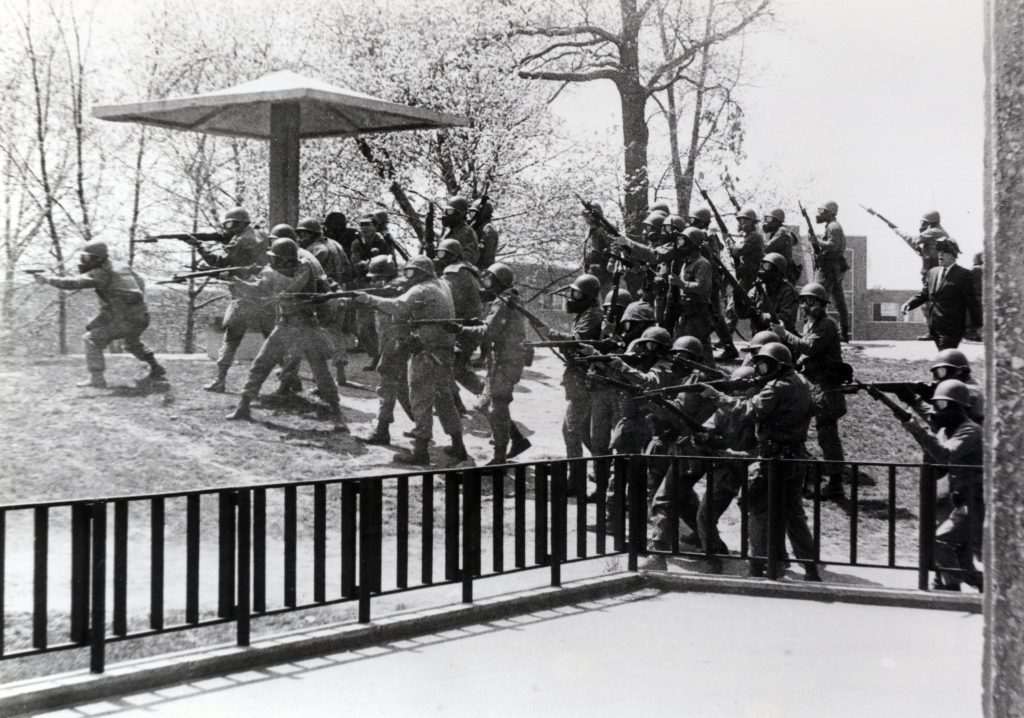
The following spring, on May 4, 1970, on the campus of Kent State University, 28 Ohio National Guardsmen open fire on a group of anti-war demonstrators, killing four students, wounding eight and permanently paralyzing another. We did not have to go to Vietnam for soldiers to kill us. Our own troops could just as easily shoot us at college and slaughter us at home.
My Pennsylvania State Police officer father eventually shows up on Penn State’s main campus in riot gear as part of a massive state police contingent. We are not on the same side as students take over Old Main, the lofty administration building where the university president hides.
Unlike before, I refuse to promise my dad not to do it again.
America today still needs all the non-violent rebellion we can get. Violence might be inevitable. But peace is always the answer. For resistance and liberation to prevail and succeed we need to protest and question authority. We need to speak truth to power and hold powerbrokers accountable. We need to take it to the streets.
I long ago internalized those lessons of war and peace.
As always, time marches on.
Mike is living in Connecticut, enjoying the good life as a wealthy conservative businessman and grandfather who voted for Trump. His college roommate Brian died a few years ago, his sweet song disappearing into the heavens where his harmless innocence lives among the clouds.
For whatever reason, Max did not talk to me at our 50th high school reunion in 2019. And after countless acid trips, Gary became and remains an evangelist preacher who recently delivered the eulogy at a national cemetery for another high school friend, a Marine who survived Vietnam and led a local chapter of a notorious outlaw motorcycle club but succumbed to pancreatic cancer. Pastor Gary’s eyes met mine from a distance, but we did not seek out each other to talk.
After more than half-a-century of fighting the system, I am still pushing political revolution as a good citizen and outlaw journalist who fights garbage corporate media as much as I fight the rest of elite mainstream politics.
Our rising’s mutinous message is as clear as the words a young woman recently shouted into the bullhorn outside the General Dynamics ammunition plant in my hometown of Scranton, Pennsylvania—President Joe Biden’s birthplace.
“Biden, Biden, you can’t hide, we charge you with genocide.”
America’s president should know better. If Democrats lose control of the country to Donald Trump or worse waiting in the wings, they will have nobody to blame but themselves.
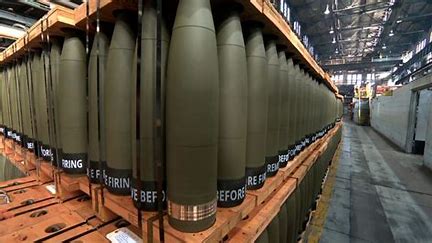
From Scranton to Columbia to Gaza and beyond, our endurance empowers our mission.
We have the right to petition government for redress of grievances. We are here to assemble and hold you accountable whether you like it or not. We do not need permission to challenge your betrayal of humanity. We owe it to the whole world that is still watching.
So look what’s coming up the street.
“We are volunteers of America,” Jefferson Airplane’s national anthem defiantly declares.
“Got a revolution.
“Got to revolution.”

CovertAction Magazine is made possible by subscriptions, orders and donations from readers like you.
Blow the Whistle on U.S. Imperialism
Click the whistle and donate
When you donate to CovertAction Magazine, you are supporting investigative journalism. Your contributions go directly to supporting the development, production, editing, and dissemination of the Magazine.
CovertAction Magazine does not receive corporate or government sponsorship. Yet, we hold a steadfast commitment to providing compensation for writers, editorial and technical support. Your support helps facilitate this compensation as well as increase the caliber of this work.
Please make a donation by clicking on the donate logo above and enter the amount and your credit or debit card information.
CovertAction Institute, Inc. (CAI) is a 501(c)(3) non-profit organization and your gift is tax-deductible for federal income purposes. CAI’s tax-exempt ID number is 87-2461683.
We sincerely thank you for your support.
Disclaimer: The contents of this article are the sole responsibility of the author(s). CovertAction Institute, Inc. (CAI), including its Board of Directors (BD), Editorial Board (EB), Advisory Board (AB), staff, volunteers and its projects (including CovertAction Magazine) are not responsible for any inaccurate or incorrect statement in this article. This article also does not necessarily represent the views the BD, the EB, the AB, staff, volunteers, or any members of its projects.
Differing viewpoints: CAM publishes articles with differing viewpoints in an effort to nurture vibrant debate and thoughtful critical analysis. Feel free to comment on the articles in the comment section and/or send your letters to the Editors, which we will publish in the Letters column.
Copyrighted Material: This web site may contain copyrighted material the use of which has not always been specifically authorized by the copyright owner. As a not-for-profit charitable organization incorporated in the State of New York, we are making such material available in an effort to advance the understanding of humanity’s problems and hopefully to help find solutions for those problems. We believe this constitutes a ‘fair use’ of any such copyrighted material as provided for in section 107 of the US Copyright Law. You can read more about ‘fair use’ and US Copyright Law at the Legal Information Institute of Cornell Law School.
Republishing: CovertAction Magazine (CAM) grants permission to cross-post CAM articles on not-for-profit community internet sites as long as the source is acknowledged together with a hyperlink to the original CovertAction Magazine article. Also, kindly let us know at info@CovertActionMagazine.com. For publication of CAM articles in print or other forms including commercial internet sites, contact: info@CovertActionMagazine.com.
By using this site, you agree to these terms above.
About the Author

Steve Corbett is a longtime state and national award-winning journalist and novelist.
He lives in Scranton, PA and can be reached at theoutlawcorbett.com.

